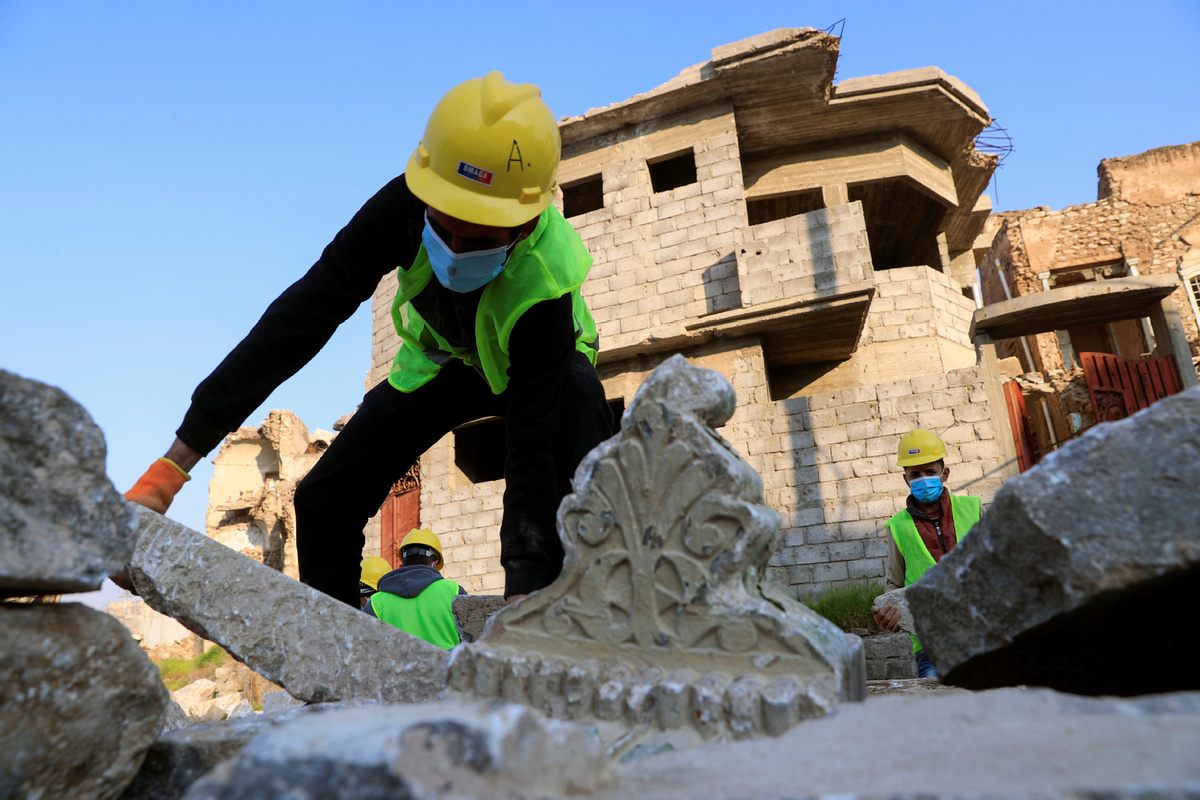Iraq needs to rebuild after war, experts say
By JAN YUMUL in Hong Kong | CHINA DAILY | Updated: 2021-07-26 09:12

Mooted withdrawal sharpens focus on country's political, social, economic woes
As talk of a possible full withdrawal of United States troops in Iraq surfaces, experts say the war-ravaged country should focus on building its domestic strength after what many have called an illegal war.
Amid a series of targeted attacks on US interests in and near Iraq, the withdrawal of all US combat forces, estimated at 2,500, is again high on the agenda, media reports say. When Kofi Annan was the United Nations secretary-general, he called the war illegal and said it "was not in conformity with the UN Charter".
Experts say the presence of US troops has not only caused huge humanitarian losses to Iraqis, but has also done little to improve their situation since the US invasion began in March 2003 on the basis of false intelligence. According to a study in 2013 by the Costs of War project by the Watson Institute for International Studies at Brown University, the cost of the US war in Iraq was more than $1.7 trillion and the US had not been held accountable.
Nagapushpa Devendra, an analyst at the Manohar Parrikar Institute for Defence Studies and Analyses in New Delhi, said the US military presence "has provoked more conflicts" between US troops and local armed forces, particularly after the Iranian General Qasem Soleimani was assassinated in Baghdad last year.
Though attacks on US forces are not new in Iraq, Devendra said, escalating violence in the region "would push the US to rethink its strategy", including about Iran.
Jawaid Iqbal, a political science professor and chairman of the Department of West Asian and North African Studies at Aligarh Muslim University in India, said the attacks on US personnel are a product of US actions.
After the invasion, the US empowered a new Shiite political class that "disturbed the balance of power and led to waves of sectarian violence", he said.
"The international repercussions of US interventionism include the birth of the Islamic State of Iraq and Syria and the conversion of Iraq into a battlefield of US-Iran conflict."
Arhama Siddiqa, a research fellow at the Institute of Strategic Studies Islamabad in Pakistan, said Iraq "has been suffering continuous setbacks" and that "decades of conflict amalgamated with neglect" has left public services in dire straits.
The pandemic accompanied by an oil price slump "only made matters worse", Siddiqa said.
Iraq's GDP shrank 10.4 percent last year, according to the World Bank. The UN Office for the Coordination of Humanitarian Affairs estimates there are 1.2 million internally displaced persons and about 4 million people in need of humanitarian assistance in the country.
The US invasion caused power vacuums in the country, did not ensure fair distribution of policymaking powers and paved the way for third-party power play in Iraqi politics, Siddiqa said.
'Dysfunctional system'
All this has led to a "dysfunctional political system driven predominately by vested interests and corruption", she said.
"Iraq is a case study of what happens when foreign powers decide to make a third country their playpen. The underlying concern is that once again political turmoil could pave the way for hard-liner militants to capitalize on."
It is time for the leaders and communities in Iraq "to shed carpetbagger politics", bar all foreign intervention, place the country's interests at the forefront and work persistently to achieve domestic strength, Siddiqa said.
"If nothing obstructs these objectives, then a stronger, more resilient Iraq can emerge. If corrective measures are not taken it will only drive the average person-whose only goal is to fulfill their basic needs-to seek refuge with extremists, further propagating an already existing vicious cycle."
Sujata Ashwarya, an associate professor at the Centre for West Asian Studies at Jamia Millia Islamia University in New Delhi, said a formal announcement of troop withdrawal has met with resistance from US Republicans, who have been pressuring President Joe Biden to launch a counteroffensive against militia attacks on US soldiers.
The Biden administration seeks to shift US attention away from disastrous greater Middle Eastern wars and toward managing adversarial relations with major countries, as well as resolving the COVID-19 crisis, Ashwarya said.
The US has blamed Iran-backed militias for recent assaults on US troops, an accusation Iran has denied. On July 7 Yehia Rasool, spokesman for the Iraqi forces' commander-in-chief, condemned the attacks.
The government, he said, "affirms its refusal to use Iraqi lands" and the security of its citizens as "an arena for proxy war".
























